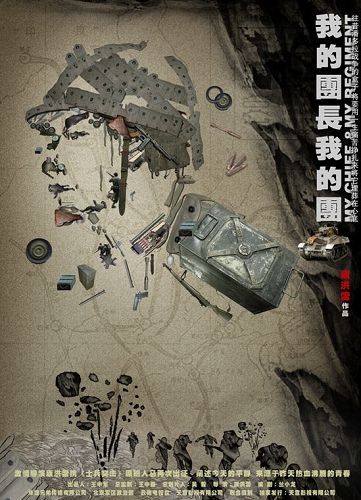
About 12 shirtless Chinese men jumped into gasoline barrels filled with black oil to make their bodies dark to make their way undetected into the Myanmar virgin forest at night. There they sneak up on several Japanese soldiers and shot them, as they had not noticed these men who perfectly blended themselves with the dark atmosphere.
This is a battle scene in the latest popular drama on the Chinese small screen called "My Chief and My Regiment". This drama adopted from a same titled novel offers a great chance for the Chinese to learn more about the wars that broke out during China's Resistance Against Japan.
Narrated by a main character named Meng Fanliao (played by Zhang Yi), the drama reveals the battle conditions between the Kuomintang expedition army and the Japanese invaders in 1942.
Long Wenzhang, the lead character, is a self-claimed leader who organizes a group of defeated Chinese soldiers in then Burma (now Myanmar) to fight against the Japanese invaders. Long was later appointed as a real commander to lead those once desperate and pessimistic soldiers to fight bravely as advance forces who sacrificed their lives at the China-Burma border.
The story tries to show the experiences of the China Expedition Army soldiers, who first came to then Burma at the request of the British colonial government, to join the Allies to regain China's only lifeline for international supplies from Japanese armies. The road from China's Kunming to Burma's Lashio was cut off by the Japanese who took control of Burma in 1942. Tragically, the attempt failed and 50,000 Chinese soldiers died in battles.
In order to truly recreate history, Lan Xiaolong, the screenwriter of "My Chief and My Regiment" and author of the novel claimed that he read tons of history books and kept contacting some of the surviving soldiers in the China Expedition Army as he wrote the novel. Lan said he was overwhelmed when he visited the National Cemetery in Tengchong, Yunnan province, the biggest one of its kind where some 8,000 Chinese and American fallen soldiers are honored for their efforts in trying to recovering the city from Japanese troops in 1945.
The 43-epsiode drama garnered lots of attention even before the first scenes were shot, thanks mostly to the popularity of the novel. But another even more important reason is the participation of the same cast and crew of a 2007 unexpectedly successful TV show called "Soldiers' Sortie", which was adopted from one of Lan's previous novels.
Four satellite television stations, namely Jiangsu, Yunnan, Shanghai and Beijing have paid over 100,000 yuan for each episode to get the rights to broadcast it first and have aired it on the evening prime time slot from March 5. They earned their money back in the first days. For example the Jiangsu station's audience rating historically hit 2.036 percent three days after the show began, the highest among provincial satellite TV stations thus far.
However, the shooting process of the drama was not as easy as it was to sell to TV stations. The cast experienced two fatal accidents while filming special effects of war scenes last year, which delayed the schedule. But the crew kept united to continue despite the difficulties and challenges. The director and all of the main actors said that they will remember the 172 tough days forever for the impact of the tragedies, the harsh living conditions and dirty makeup everyday.
Their efforts have won them praise from a great number of audiences, as many are fans of the last hit "Soldiers' Sortie". Li Shi is a devout fan of Duan Yihong who plays Long in "My Chief and My Regiment". "Duan and the other male characters are definitely masculine while fighting with the enemies. I will watch whatever shows have him in them," said Li, who represents fans who admire actors in war dramas.
Besides those who fancy TV stars, military fan Xiao Yu is excited looking at the different weapons, uniforms and everything related with the forces 60 years ago in the drama. "We never had a chance to see so many guns and war scenes used by the Kuomintang army in that period. It's really a fantastic experience for us military fans."
Zang Na is neither a fan of TV shows nor the military, but she also thinks it is worth watching the show since it "tells the history I didn't know much of before."
However, the show got harsh criticism as well. Zhou Chuanji, a veteran of the China Expedition Army and a retired professor of the Beijing Film Academy, blasted the show as "rubbish". "Nothing is correct in that drama," he claimed in an article, saying that real soldiers in an expedition army are clean and well-armed, not like the shabby ones as depicted in the drama. And the uniforms, weapons and the other military props were not at all like the ones we used."
Apart from the criticism of the details, ordinary audiences more often focus on the content of the show. Many complained they cannot understand the conversations philosophizing about life and each episode seems to go very slowly. "I really can't bear its slow speed and the darkness of the environment. So I gave up watching it," admitted Sun Xiaomeng, who initially was excited about the drama.
No matter what audiences think about "My Chief and My Regiment" it has successfully become the biggest hit in China's TV drama market in March. Producer Wang Zhongjun, and also chairman of Huayi Brothers Pictures Co., Ltd, said the drama was sold out with the highest price compared with other shows produced by the company last year, despite costing 40 million yuan to produce. "We certainly make a profit," smiled Wang.
(China Daily, March 20, 2009)